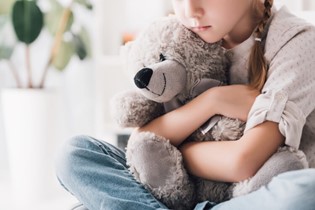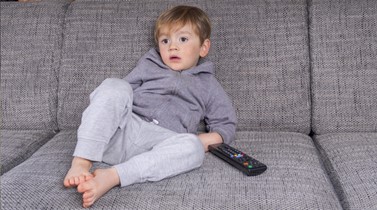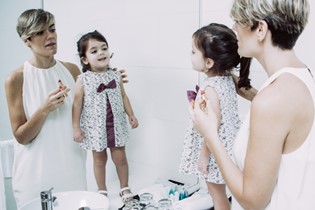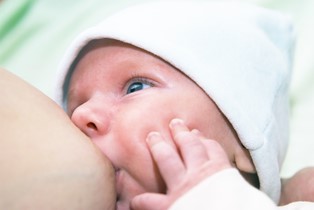Psychologist explains how to help a child deal with grief
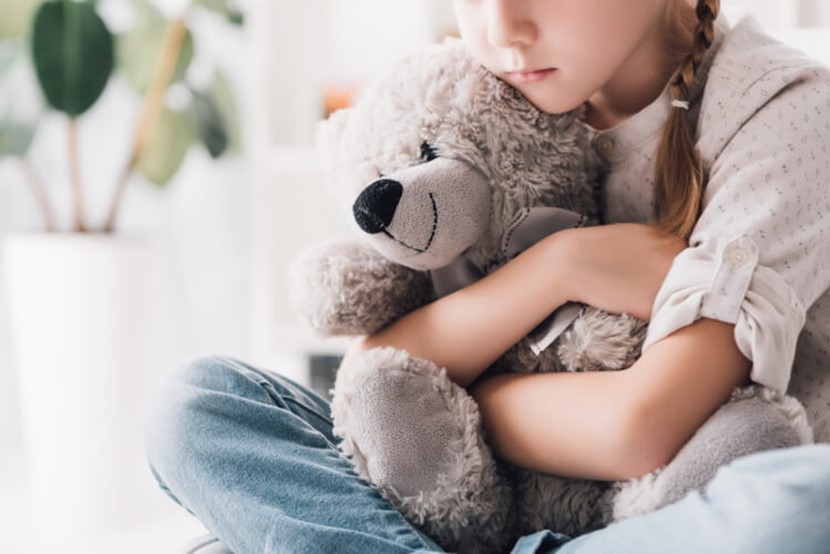
It's one of the most difficult conversations you'll ever have with your child - telling them about the loss of a loved one, whether through death, divorce, or a change in life circumstances. Most of the time, 'going away' is followed by 'coming back', and when someone important to your child is gone from his or her life permanently, it can be very confusing and upsetting. Clinical psychologist Dr Melanie Woodfield has some advice for parents on how to talk to your children about grief and loss.
In an attempt to shield a child from pain and heartache, many parents shy away from discussing death, grief and loss. The old cliché is true, however: Death is a part of life. It's inevitable that children will experience some form of loss of a close relationship at some point, whether that is the loss of a grandparent, close friendship, or a pet. Being prepared to assist children to cope with this loss is a wise move.
A friend recently told me that she and her sons often visit the cemetery near their holiday home. The family spend time reading headstones, noting how long people had lived, and how they had died. The boys often pick flowers for the graves and remove litter and weeds from the area. These activities always prompt deep discussions about life, death, spirituality, and loss. Far from being "spooked", the boys appear to have a calm acceptance of the inevitability and irreversibility of death.
Obviously, this holiday activity won't suit everyone, particularly those with toddlers, who are more likely to see a whole lot of perfect concrete surfaces for racing trucks! It illustrates, however, the importance of "normalising" loss, and preparing children in advance, even in small ways.
We're talking not only about the death of a family member, but also of the loss associated with the end of a relationship, or the grief associated with a significant change in the intricacies of a relationship (such as often occurs between parents and children when parents separate).
The loss of a pet is one that many children will face, as our furry friends live shorter lives than their human counterparts. Pets serve as friends, playmates and sources of unconditional love. The loss of a pet can bring about confusion, sadness, and can prompt children to ask some of the big questions in life, such as whether there is a heaven, and where people go when they die.
Children and grief
While there are some general principles that we can apply to understanding how children grieve, every child is different, and we know that there are some group differences, such as how boys and girls react to loss. In 1999, J William Worden carried out a study looking at differences and similarities in the impact on children losing a parent, as opposed to a sibling. He and his colleagues compared two groups (one group had lost a parent, and the other had lost a sibling), with 75 school-aged children in each group. They interviewed the children four months after their loss, and again at one and two years after the loss. Children's well-being was assessed by a commonly used measure of emotional and behavioural well-being.
The results of this study indicated that there were no significant differences between the two groups in the key areas examined. But, interestingly, when the two groups were considered by gender, differences appeared. Boys were more impacted by the loss of a parent than by the loss of a sibling, and girls more affected by the loss of a sibling, particularly a sister. This study wasn't huge, but gives an interesting insight into how children's experiences of grief and loss can be similar, but different, according to their gender.
Ages and stages
Another factor influencing how children experience loss is their age and developmental stage. The younger the child, the more likely they are to be affected by the practical changes that often accompany loss. Changes can include simple things such as an altered routine, or an upset caregiver, as opposed to the "deeper" issues.
Babies can be more difficult to settle, and can pick up on subtle changes in parents' moods. Toddlers tend to be very "present"-oriented (as opposed to future- or past-oriented). Their response to loss is often intense, but brief. This loss can be viewed by toddlers as reversible, not permanent - they truly (developmentally) find it difficult to comprehend that their loved family member or pet will not come back.
Grieving toddlers may developmentally regress (go backwards) for a time, for example, resuming bedwetting and/or soiling when they've been toilet trained for some time. This is common, and usually not a cause for concern. Toddlers benefit from frequent reassurance, repetition of basic age-appropriate information, and consistency in routine.
When speaking with toddlers, be aware that young children may be confused about the apparent "random" nature of loss, and may become anxious that other family members, such as parents, could unpredictably pass away in the near future. It's likely to be useful to reassure them that, while some losses are "random", mostly they accompany old age and/or illnesses, and Mum and Dad aren't going anywhere in the near future!
Children move through developmental stages as they age, and will process grief and loss in different ways, according to their developmental stage. Five- to seven-year-old children, for example, may still view their loss as reversible, and may even take responsibility for the loss, thinking things such as "Mum and Dad would still be together if I'd been a better girl!" or "My rabbit died because I didn't want to clean the cage." It's only when children reach approximately 11-12 years old developmentally that they begin to process loss in a similar way to adults, by understanding that their loss is permanent, and displaying "traditional" mourning habits.
'Normal' grieving
In their recent book about treating traumatic grief in children and adolescents, Judith Cohen and her colleagues comment on typical tasks of "normal" grief and loss in children, which include:
• Experiencing the profound pain associated with the loss (of a loved one, pet, etc.).
• Accepting that the loss is permanent (as mentioned, this varies according to the developmental stage of the child).
• Reminiscing about the lost loved one and accepting that the loved one was a complete person - with good and bad bits.
• Changing the nature of the relationship from "one of interaction to one of memory".
• Including important parts of the lost loved one into the child's own self-concept or self-identity.
• Making a commitment to forming and maintaining new relationships.
It's very difficult to describe "normal" behavioural and emotional changes that accompany loss experiences for children. As with adults, some children will become quiet and reflective, and others angry and defiant. Grief can have a profound impact on even very young children, and it should not be assumed that quiet children are necessarily coping better than outgoing children.
Talking to children about grief and loss
Every year of your child's life that passes gives you another year's experience of talking to children. But conversations about the nutritional value of broccoli ("But it's really goooood for you…") and the importance of toilet-training do little to prepare parents for tackling the big topics. Unfortunately, we know that issues like divorce, re-partnering and death are common in New Zealand households. Even if these issues don't personally affect you or your children, newspaper pictures, the TV, and other children can plant seeds that can lead to you needing to tackle some tricky topics. Here are some simple principles that can help.
Stay calm
Children need to feel emotionally (and physically) contained. If they see that you are overwhelmed by what's happened, they'll either talk to someone else, or not talk at all. Stay calm, and save the "Oh my goodness!" for the debrief with another adult later. If it's too late, and your child has already picked up that you're horrified or upset, it's usually helpful to be honest: "Mummy's feeling really sad about Granny dying, so that's why I'm crying. When people die, it's normal to feel sad and to cry for a while, then people usually feel a bit better."
If you're so distraught that you can't get the words out, it's probably best to have another, calm, adult alongside to talk your child through what you're feeling and what's happening. Remember that children under five usually can't identify many emotions - typically just the "big three" of happy, sad and angry, so explanations need to be basic. Reminding the child of a time when they felt a similar way might help - "Remember when you got that new doll, but it was broken and we had to take it back? Remember how you felt really sad? Well, Mummy is feeling sad now, a bit like you did back then."
What to say
Unfortunately, there aren't any concrete rules about what to say to children of a particular age. Be guided by your child's developmental level - many two-year-olds will still be mastering the basics of sentence construction, and, while they generally comprehend language better than they can produce it, they won't necessarily benefit from an extended, one-sided discussion.
With babies and young toddlers, it may be wise to take a "watch and wait" approach, while focusing on the basics of ensuring consistent and predictable feeding and sleep times. Be prepared, as explained above, that your child may regress for a time, and go back to, for example, wanting their night feed, dummy or comfort blanket. This is normal and healthy, and is usually an attempt by the child to seek comfort, when they don't necessarily have the language ability to ask for it.
Three-, four- and five-year-old children are more likely to verbally question the change that has occurred - perhaps directly asking, "Where's Granny gone?" or "Where's my rabbit?" Again, there isn't a perfect answer you can provide, but age-appropriate honesty is generally a good thing. Give the child as much information as you truthfully can.
For example, in a parental separation situation, if your child is asking, "Will Daddy come back to live with us?" there is little benefit in creating false hope in your child (and delaying the inevitable) by saying "Maybe" if that's not an option. Instead, saying, "I bet you really wish that Daddy would come back and live with us. To be honest, I don't think that's going to happen. You'll still see Daddy lots, though, and Daddy and Mummy still love you just as much as we ever did" may be more helpful. Be prepared that you may have to repeat this information many times, as the more distressed a child is, the less likely they are to retain key information.
Grief is normal and natural
Metaphors can really help to explain difficult topics to children who want an explanation of what's happened. There also are some wonderful books and stories on the subject that are written in age-appropriate language for children, as well as some helpful resources on the internet.
Grief is normal, and usually a natural, healthy process. But, if your child's behavioural or emotional changes are extreme, continue for longer than a few months, and impact on their ability to go about the activities of everyday life (eating, sleeping, attending kindy), consulting a professional is wise.
Dr Melanie Woodfield is a child and adolescent clinical psychologist in Auckland.

AS FEATURED IN ISSUE 2 OF OHbaby! MAGAZINE. CHECK OUT OTHER ARTICLES IN THIS ISSUE BELOW



